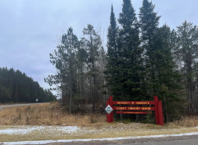By Lee Egerstrom
The bonds between a Minnesota church and Native people with Indigenous prisoners in Pennsylvania are still under stress with both an accomplishment to celebrate and a setback perpetuating frustration.
The celebration comes from the recent publishing of Forgotten Nation, a book by Pennsylvanian prisoner R.R. Banks that is available through Amazon.com. The disappointment comes from Pennsylvania Department of Corrections resistance to Indigenous prisoners using a sweat lodge at State Correctional Institution Benner Township, a state prison at Bellafonte, Pa.
The prisoner, who uses the name Running River Banks, had sued the Department of Corrections for the right of SCI Benner prisoners to use a sweat lodge for religious and cultural purposes. He, and his fellow prisoners and their friends, succeeded.
Ties involving a chaplain at the prison with Mendota Mdewakanton friends in Minnesota resulted in Banks and fellow prisoners turning for help from the Cherokee Park United Church in St. Paul’s West Side. The church provided aid in administering funds from the legal settlement and finding other donations for building a sweat lodge. UPUC members and their pastor also found volunteers to travel to Pennsylvania to build the sweat lodge.
That effort was reported in a November 2023 article in The Circle. But it wasn’t the end of the story.
The legal settlement between Banks and prisoner colleagues with the DOC allows four sweat lodge observances annually. That isn’t happening as intended said Susan Strebig, a member of the Cherokee Park congregation and retired social worker who has bonded with Banks.
The first sweat ceremony was held after the lodge was built in October. Only three of 15 Native prisoners were allowed in, Strebig said.
Another ceremony was set for Dec. 22 “but was cancelled with no reason given the inmates.” A third was set for March 16 but turned out to be a “mockery of the settlement,” she said. Only two of 25 prisoners who applied to participate were approved to participate.
“The law suit settlement stipulated that it could be used a minimum of four times a year, and also that men who the prison thought not physically fit for the experience could participate if they signed a waiver of responsibility,” Strebig told The Circle.
“None of the men were even given physicals, and no waivers were allowed to be signed.”
Strebig said she is now “scrambling” to get people to contact the Pennsylvania Department of Corrections to encourage it to carry out the conditions of the prisoners’ law suit settlement.
This is a continuation of the somewhat unusual, but understandable saga of friendship between Minnesotans and Pennsylvanian prisoners noted in Banks’ new book.
Banks dedicates Forgotten Nation: The Making of a Movement, to his mother, other relatives and friends, spiritual leaders and chaplains, and to whom he calls his “Cherokee Park United Church family.”
He specifically credits the late Dennis Banks, a founder of the American Indian Movement that was started in Minneapolis, with whom he shares a name but not a family relationship. From inside his SCI Benner cell, Banks has formed a unique Pennsylvania branch of AIM, called the American Indian Movement Peoples Alliance (AIMPA), and he serves as its president.
Help in that endeavor came from Mike Forcia, Minneapolis president of AIM; and Banks also credited the Native American House Alliance. The latter is a nonprofit that works to strengthen cultural awareness and support the general welfare for an estimated 6,000 Native Americans living in the Philadelphia area.
Like many in Pennsylvania’s Native population, Banks is of mixed cultural background with both Native American and Congo tribal heritage. Through his contact with others, and especially with a Native American prison chaplain, Banks began to seriously study and rediscover his Indigenous cultural inheritance.
That spiritual leader is Chief Ammon Bailey, known as Chaplain Bailey within the institution. Elsewhere, he is also known as Chief Ammon and Chief Good Bear, and works under contract as a chaplain with the state.
The “chief” honorific comes from Native inmates he serves and from the Yankton Sioux Tribe in South Dakota. Bailey has been a Sundancer at past Yankton Sundances in Pipestone, Minn.
A St. Paulite, Joy Sorenson Navarre, has been a link between Chief Bailey and the CPUC church that is a civil rights-oriented congregation. Like she and her husband Lon, many congregants are Mendota Mdewakanton Tribal Community members. Lon Navarre is a pipekeeper for the Mendota Mdewakanton.
The book is essentially a self-portrait of Banks and how he has evolved with help from spiritual leaders and friends – new and old – who have been supportive influences on his life. The “Forgotten Nation” he now seeks to serve from inside a prison are all the forgotten indigenous peoples.
In an email comment passed along by CPUC members, Banks described them this way: “Those who have lost their identity; those who are oppressed, and those who are left behind.”
Retired social workers Strebig expands on that to include those who have died for their culture and lands, and those alive but are addicted, homeless, or otherwise shoved aside and often abandoned by society.
She began weekly communications with “River,” as she calls him, about two years ago. In a foreword to the book, she said through him she has come to know many of his “incarcerated brothers.”
Their lives run a parallel course, she said, including discrimination, poverty, prison, and when released, often more poverty and more prison.
The Rev. Matthias Peterson-Brand, pastor at CPUC church, described Banks in another brief foreword to the book. “Running River is a warrior for justice, a friend and mentor to many, and a wise spiritual leader. River’s spiritual roots run deep and sustain his courage to advocate for Indigenous religious freedom in the carceral system.”
Forgotten Nation is the second book by River, or R.R. Banks. The earlier one, also available through Amazon or special order through bookstores, is called Our Ancestors Are Proud: A Native American Prison Story.”







